Welcome back to another edition of “some horror movies I’ve watched this month.” I’m Keef, and I’m watching (at least) 31 horror movies during the month of October, as previously discussed. Instead of the batch-movie format, this post will discuss a single movie, mostly because I started writing about it and then couldn’t stop.
17. Schalcken the Painter (1979)
This was a really pleasant surprise. Schalcken the Painter is a BBC movie based on a short story by Sheridan Le Fanu, starring Jeremy Clyde in the title role, with a fantastic supporting cast. But really, the star is the filmmaking and set design itself. In the creation of this movie, the lighting, camerawork, and eerie stillness takes center stage. There are many shots of the painters at work, showing the models in their poses and surroundings, clearly meant to evoke or even reproduce the works of the old Dutch masters themselves. It’s nearly Barry Lyndon-esque in its beautiful lighting and careful pacing.
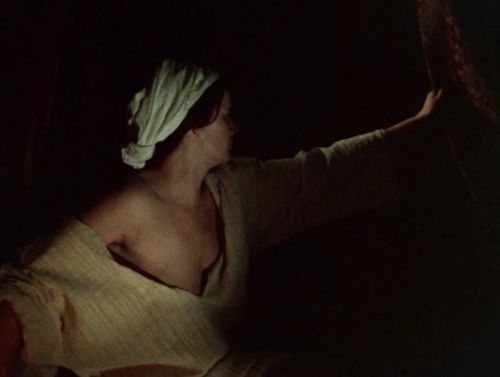
Additionally, the whole thing is narrated, and there are many pauses for what is in effect a brief historical lecture on Dutch art in the 15th century, providing some context for the action. Very informative, about the historical figures involved and the larger societal mores and attitudes, which inform the plot a fair amount. To its credit, this information is delivered very well, being interesting and informative without becoming preachy or boring.
It doesn’t hurt that there’s a lot of nudity in this movie.
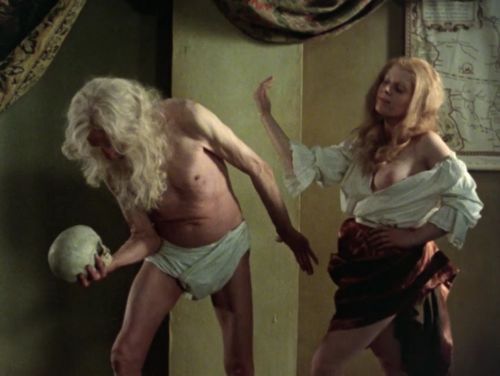
After the first ten movies or so in this series, when I had the idea to start blogging this stuff, I started taking lots of screenshots of these movies as I watched them. I knew that it would be fun to show these afterwards, and taking them in the moment meant that I had the ability to sort of “live tweet” these things via text with some friends. Take a screenshot, send it to a friend with commentary, chat about the movie. So I chose a lot of funny or interesting screenshots– I went for frames with good composition, or startling horror or gore aspects, or nudity.
Did I mention that this movie– a BBC TV movie– has a lot of nudity?
And so but anyway, I’m sending text messages back and forth with Ed Ringtone, and he made a remark that this looked like “Whoops My Titty: The Movie.”
Which is not entirely inaccurate. In an effort to recreate the paintings of the Old Masters, many of which included nudity, the movie itself incorporates those same titty-related elements.
Unfortunately, the adherence to the source material provided another side effect– the movie itself was shelved for being prurient, and was unavailable for a very long time. It is now available for purchase on the BFI website, but if you read the IMDB reviews page, as I did because this movie is incredibly good, it’s riddled with people complaining about the lack of availability of this film. They discuss how it was shown about three times in the last thirty-five years, including the initial airing, and half of the reviews include pleas for anyone who owns the movie to contact the reviewer to trade VHS tapes or whatever.
The fact that so many people, a quarter-century after the fact, remembered this film fondly and desired a repeat viewing, says more about the haunting and memorable qualities of the movie than I could.
Now here’s some more nudity.
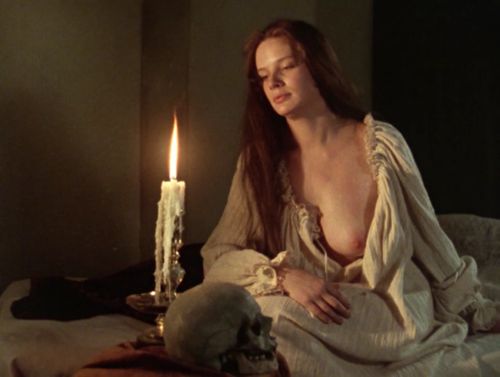
Also, my god, the costumes and wardrobe in this thing. In conjunction with the lighting and direction, this movie looks good enough to eat.
Anyway, the story starts with the title character being a lowly student, studying under the painter Gerard Douw, who was at the time much more well-known. Over the course of his studies, Schalcken falls in love with Douw’s niece, the beautiful Rose, played fantastically by Cheryl Kennedy. She, of course, also falls for him, in a beautiful playful back-and-forth of shared glances and affectionate grazes.
Alas, there is conflict. A strange man, claiming to be “Minheer Vanderhausen of Rotterdam,” shows up. He offers Douw, nearly blind in his old age, a fortune in gold for the hand of his niece. From the story, and neatly paraphrased in the film:
Gerard Douw knew nothing of the attachment which had sprung up between his pupil and his niece; and even if he had, it is doubtful whether he would have regarded its existence as any serious obstruction to the wishes of Minheer Vanderhausen. Marriages were then and there matters of traffic and calculation; and it would have appeared as absurd in the eyes of the guardian to make a mutual attachment an essential element in a contract of the sort, as it would have been to draw up his bonds and receipts in the language of romance.
Douw agrees, and in effect sells his niece to Vanderhausen.
Neither Schalcken nor Rose have any idea about any of this. The man shows up at dinner and throws back his hood, revealing that he is horribly, horribly wrong:
all the flesh of the face was coloured with the bluish leaden hue… the eyes showed an undue proportion of muddy white, and had a certain indefinable character of insanity; the hue of the lips bearing the usual relation to that of the face, was, consequently, nearly black; and the entire character of the face was sensual, malignant, and even satanic.
Rose says something to the effect that she would not like to ever see that man again, which is when Douw drops the bomb that she is now engaged to the walking corpse. Surprise!
Rose begs Schalcken to elope with her. He refuses, saying that he will become a rich painter, and then buy out the marriage licence (or whatever weird equivalent existed in 15th century Netherlands).
She packs her bags, gives him a last glance, and goes.
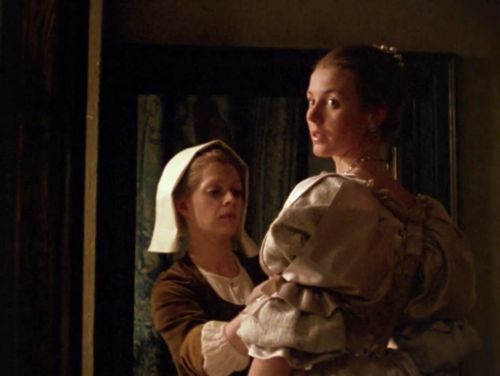
Despite the movie itself being more than a third of a century old, and itself based on a hundred-and-fifty year old short story that’s in the public domain as part of the Gutenberg Project, I still get squeamish and discomfited about posting any spoilers.
So. Spoilers ahead. Here there be spoilers.
A few weeks after the marriage, Douw hears nothing from Rose, and asks Schalcken to go find her. He goes to Rotterdam, and can find hide nor hair of Vanderhausen or Rose.
He gives up. He gets older. He remains unsatisfied, and begins to paint damning indictments of capitalism and the intermix of money and affection that existed at the time. After a long period of years, Rose returns to the house, all scratched up and rough. She begs Schalcken not to leave her alone. Frenetic, worried about her, he steps out of the room for a minute– and hears screaming. The door slams shut. He eventually gets it open, and discovers the window inside is open, and there are ripples in the water of the canal below.
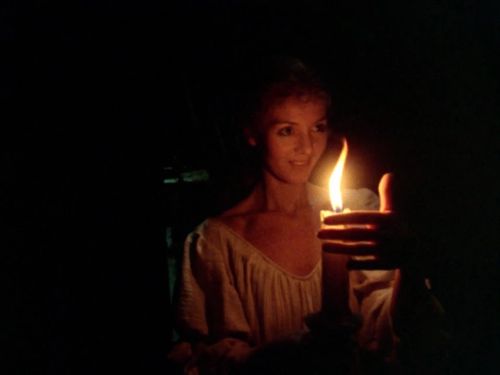
Then, things start to get really bad.
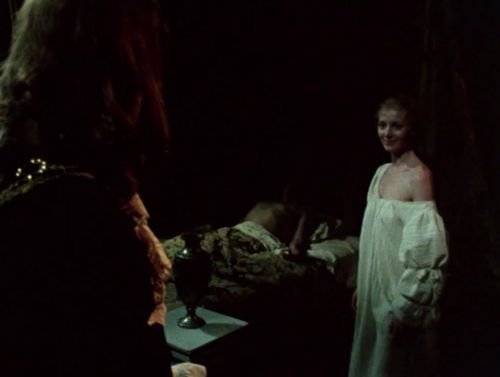
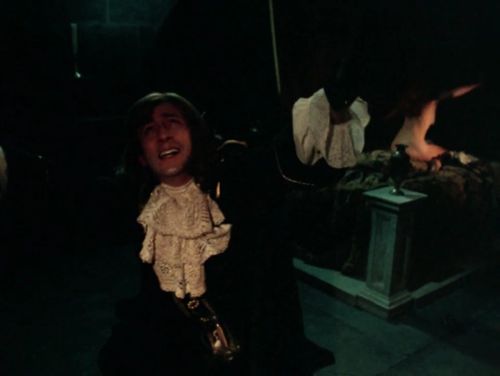
NO MORE TEXT SPOILERS WATCH THE DAMN MOVIE
